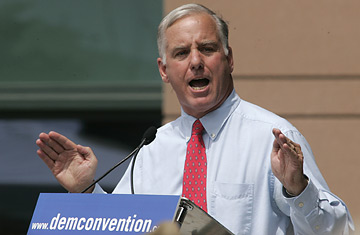
Democratic National Committee Chairman Howard Dean speaks at the kick-off countdown rally at the Pepsi Center in Denver on August 22, 2007. Denver is the host city for the 2008 Democratic Party Convention.
What in the world is Howard Dean thinking?
I don't know where the Democratic National Committee chairman was in late 2000, but I was here in Florida, shuttling between Miami, Tallahassee and Palm Beach County to cover the surreal presidential vote recount. You didn't have to have a Ph.D. in political science to learn from that crisis that Florida, because of its burgeoning size and centrist electorate, can swing a general election. It was also clear that Florida's losing Democratic Party had suffered wounds, some of them self-inflicted, that would take years to recover from. Until this year, in fact, Democrats seemed virtually irrelevant in the state legislature, and their 2002 and 2006 gubernatorial candidates had all the charisma of Gulf sea sponges. While the party triumphed all over the country in last year's national elections, the only major Republican opponent it defeated in Florida was Senate candidate and former Secretary of State Katherine Harris — an erratic lightweight who most G.O.P. leaders privately hoped would lose.
So now, just as that state party is regaining full use of its limbs, it defies credulity to watch Dean and the DNC go out of their way to chop them off. This past weekend the DNC threw the book at the Sunshine State's Dems for signing on to Florida's recent move to hold its 2008 presidential primary election two months earlier than usual and a week earlier than DNC rules allow. Florida's Democratic Party has 30 days to back out of the new Jan. 29 primary or face forfeiting all of its delegates and votes at the Democratic National Convention next summer, according to the draconian DNC ruling. (The Republican National Committee's rules also frown on the earlier primary, but the RNC hasn't demanded that Florida's G.O.P. reschedule it for a later date.) As Dean warned earlier this summer, if Florida's Democrats insist on holding their primary in January, it "essentially won't count." To which Florida's Senate Democratic minority leader Steve Geller says, "I question whether Howard Dean is working for the Democratic Party or the Republican Party."
Geller's confusion is understandable for a number of reasons. Florida Democrats had, and have, little choice but to go along with the state's decision to leapfrog its primary from March to the front of the pack in January. First, they didn't have the votes to block it: Florida's legislature is controlled by the G.O.P., as is its Governor's mansion. More important, most Floridians want their primary moved up: the 2000 debacle may have subjected them to national ridicule, but it revealed the peninsula's new bellwether muscle — and they feel they deserve to flex it now in a presidential kingmaking process that could be decided by March of next year.
Telling them they don't deserve it isn't going to endear the Democratic Party to a state that is regularly referred to these days as the new California. In Florida, as Geller notes, national elections are often "poised on the edge of a razor blade. They can go either way." As a result, Florida's Democrats are dumbfounded that Dean and the DNC would put the state's 27 electoral votes at risk, not only by muffling its say in the Democratic nominating process — top Democratic candidates will be less likely to stump in Florida if the DNC sanctions are carried out — but also by alienating the peninsula's legions of centrist and independent voters in the general election as well as local and state races.
And for what? To make sure Florida and everyone else adhere to one of the most absurd presidential nominating processes in the free world? It's amusing to hear the DNC big shots argue that if Florida got its way in this case it would invite "chaos" in the primary system. One of the main reasons Florida wanted to move its primary up in the first place was to get ahead of the chaos that already exists. Third World countries like Mexico today hold more modern and truly democratic primaries than America's, whose Iowa- and New Hampshire-centric traditions seem as atavistic to a lot of people as using groundhogs to forecast the arrival of spring. If a silver lining emerges from the Florida-DNC standoff, it might be a consensus on a new arrangement, like the rotating regional primary schedule endorsed by the National Association of State Secretaries of State — the people who actually have to run these elections.
Meanwhile, Florida's Democrats are formulating a response — and don't bet on them caving in to the DNC. For one thing, the costs and logistics of arranging a separate, later primary election look prohibitive. More crucially, state party leaders like Geller simply believe Dean and the DNC are out of line. Florida's Democratic Senator, Bill Nelson, is threatening legal action to test whether poltiical parties actually have the kind of authority the DNC is trying to assert. And Geller says he even plans to urge Democratic donors in Florida, one of the country's most lucrative sources of political cash, to boycott the national party and keep their funds in the state if the DNC sticks to its ruling. Perhaps the national party will wise up, he says, if it faces the prospect of losing all that Flori-dough.
